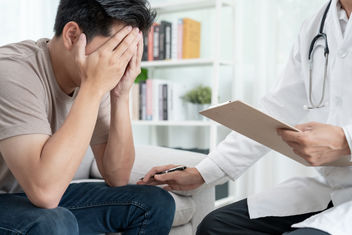Finding Treatment for Anxiety and Depression
March 1, 2022Mental health has become a more prevalent topic of conversation in recent years. Many Americans struggle with mental health, often going undiagnosed or untreated. Anxiety and depression are just two of many common mental health disorders that plague our society. Here, we’ve put together a helpful guide for finding treatment for anxiety and depression.

The Inside Rx Blog
Get the Inside Scoop on tips & tricks that may help your family save on prescriptions!
Subscribe to stay up to date with the latest news and tips
If you’ve been waking up each day with an overwhelming sense of dread or despair, you may be battling anxiety or depression. It can be hard waking up each day with the burden of mental health problems. But treatment is out there.
Getting the right diagnosis from a healthcare provider is important to get the treatment you need. For example, you may be living with an underlying condition causing anxiety or depression. After being diagnosed, a specialist may recommend treatments such as psychotherapy and medications.
Talk therapy
Also known as psychotherapy, talk therapy involves looking at thought processes or behaviors that may be causing anxiety or depression. Talk therapy can help manage your symptoms and teach you how to overcome obstacles in your daily life.
There are different forms of psychotherapy that may be carried out by a mental health professional one-on-one or in a group setting. Treatment for anxiety and depression is personalized based on your overall condition and treatment goals.
Through cognitive behavioral therapy, a type of talk therapy, a mental health professional can help you identify specific thoughts or behaviors and replace them with thoughts or behaviors that help you. You might learn problem-solving and grounding skills to deal with thought patterns linked to your anxiety or depression.
Interpersonal therapy is another form of talk therapy that involves focusing on the social aspect of your condition. Often, interpersonal issues like problems with loved ones, friends, or coworkers can cause or worsen symptoms of anxiety or depression. Through interpersonal therapy, you’ll learn to communicate and relate more deeply with others around you.
Other forms of psychotherapy may work better for you. In some cases, psychotherapy is combined with prescription medications to help you feel better.

What to Know About Seasonal Depression (and How to Prepare)

The Hidden Connection: How Mental Health and Chronic Illness Shape Each Other

5 Ways to Improve Mental Health Naturally

10 Essential Tips for Navigating Holidays and Mental Health
Medications
Your doctor may prescribe a prescription medication to help manage anxiety or depression. Luckily, some medications work in different ways to help treat anxiety, depression, or both.
Antidepressants
Antidepressants may be prescribed as a treatment for anxiety and depression. The most commonly prescribed antidepressants include selective serotonin reuptake inhibitors (SSRIs), such as Lexapro (escitalopram), Celexa (citalopram), and Prozac (fluoxetine).
Other antidepressants include serotonin and norepinephrine reuptake inhibitors (SNRIs), tricyclic antidepressants, and atypical antidepressants. Antidepressants generally work to increase serotonin levels in the brain. Serotonin is believed to regulate mood, emotions, and sleep.
Benzodiazepines
Benzodiazepines are a group of drugs that act as sedatives and work on the GABA receptors in the brain. These medications help slow down brain activity to relieve anxiety symptoms. They may also be used for insomnia or before procedures for sedation. Examples of benzodiazepines include Xanax (alprazolam), Klonopin (clonazepam), and Valium (diazepam).
Lifestyle changes
Changing lifestyle habits can be an effective way to cope with anxiety and depression. Regular exercise can help you get out of your mind and into your body. Regular exercise improves your self-esteem, self-confidence, and overall health.
Eating a healthy diet can ensure you stay nourished even when you’re feeling down. Try to avoid caffeine and alcohol, which can worsen symptoms of anxiety or depression over the long run.
High-stress levels can worsen symptoms of anxiety and depression. Try relaxation techniques, such as yoga or meditation to help keep your stress at bay.
Alprazolam
$ 7.81Citalopram Hbr
$ 13.67Pay less for your medications with Inside Rx
Treatment for anxiety and depression can be expensive. Inside Rx may help you save on all your prescription medications, including antidepressants. If you don’t have adequate insurance coverage, you may have to pull the total retail price of your medication. Inside Rx could help you save up to 80% on generic and brand medications.
Use the search tool on the Inside Rx website or mobile app to find your prescription medication. You can compare prices across the different pharmacies closest to you. Instantly download, text, email, or print your unique Inside Rx savings card and bring it with you to one of the 60,000+ pharmacies the card is accepted. Show your card to the pharmacist at check out to save!
For more information on Inside Rx, visit our Help page.